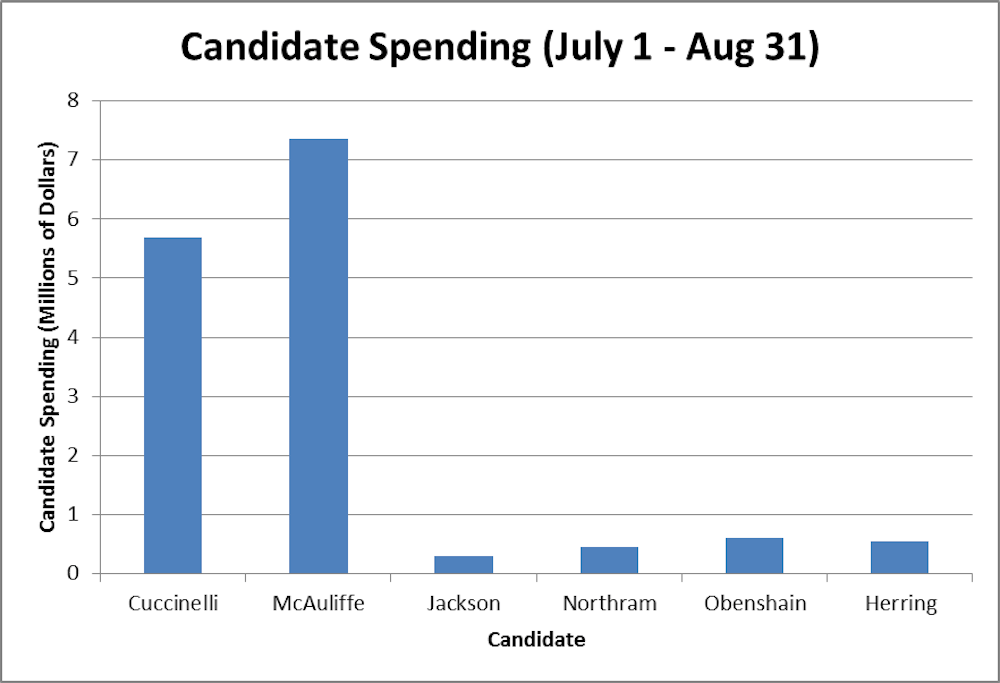According to campaign fundraising statistics released for the months of July and August, Democratic gubernatorial candidate Terry McAuliffe outraised Republican nominee Ken Cuccinelli by almost $1.3 million. The reports, released by the Virginia Board of Elections, also contained information on the other Republican and Democratic campaigns in the gubernatorial, lieutenant gubernatorial and attorney general races.
From July 1 to Aug. 31, Cuccinelli raised $5,688,220, while McAuliffe raised $7,355,244.
Currently, McAuliffe has a 4.2 point lead over Cuccinelli, according to Real Clear Politics, a poll aggregator.
Center for Politics spokesperson Geoffrey Skelley cautioned, however, that it can be difficult to tell whether increased funding causes a lead in the polls or if a lead in the polls causes more donations.
“If McAuliffe continues to lead in the polls, that can start to affect [his] fundraising dollars,” Skelley said. “[The donors] will be more inclined to give to him because he’s winning.”
Second-year College student Porter Koolman, the financial officer for the University Democrats, viewed the McAuliffe campaigns’ current finances as a positive sign.
“I think it’s a really encouraging sign to be honest,” Koolman said. “Money is important in elections. Money doesn’t win elections. Votes win elections. But having more money is definitely a big plus.”
Third-year College student Elizabeth Minneman, president of the College Republicans, had a different view on the importance of finances for this election.
“Money isn’t as big as a deal as a lot of people think in these in elections,” Minneman said. “Cuccinelli has a lot of grassroots support.”
Though each candidate in recent press releases said most of their donors gave small contributions of $100 or less, the majority of their funds came from a few large contributors.
In a Sept. 16 press release, Cuccinelli announced his funds came from 10,304 donors. But the majority of the funding during that period came from 35 large, in-kind contributions, the largest donor being the Republican Governors Association.
Similarly, in another press release that day, McAuliffe announced 82 percent of his donors gave contributions of $100 or less. Like Cuccinelli, however, most of McAuliffe’s funds came from large cash contributions. The largest of his cash contributions came from the Democratic Governors Association and miscellaneous political action committees, followed by organized labor.
Recent statistics show most funds for both candidates have been coming from out of state. In the past year, 68.9 percent of Cuccinelli’s funds and 73.4 percent of McAuliffe’s funds came from sources outside of Virginia.
Skelley said that this influx of out-of-state funding is not that surprising.
“In this day in age, it is sort of to be expected, especially because there are only two notable elections going on: the New Jersey election and the Virginia election,” Skelley said.
Koolman further clarified this phenomenon, saying the few elections during off-years give major national donors their only opportunities to influence elections.
“The dynamic between 2012 and now also plays a part because you have Super PACs raising money in the off-years,” Koolman said. “An off-year election means that you have Super PACs looking for elections to impact.”
Minneman also added that increased out-of-state funding did not necessarily mean that in-state interest in the election has decreased.
“We’ve seen a lot of help coming in from out of state but that doesn’t mean there isn’t as much in state excitement as there has been in past years,” Minneman said.
The trend of receiving large portions of funding from out of state notably did not extend to the lieutenant gubernatorial and attorney general campaigns. All the non-gubernatorial campaigns were alike in that most of their funding came from in-state and that most of their funds came through large cash contributions.
Ralph Northam and Mark Herring, Democratic candidates for lieutenant governor and attorney general, received 99 percent and 94.3 percent of their funding from in-state sources in 2013, respectively. Republican candidates for the offices, E.W. Jackson and Mark Obenshain, received 88.8 percent and 81 percent of their campaign funds from Virginia donors during the past year.
The differences in the finances for the candidates running for lieutenant governor and attorney general arose in the type of donor primarily supporting each candidate.
Democrats Northam and Herring received most of their funds from a mix of PACs, small businesses and individuals. Conversely, Republicans Jackson and Obenshain relied much more heavily on individual donors for their funding.
Minneman said the race would still be interesting in the coming weeks and that voters may still see some changes in the finances and popularity of the candidates.
“It’s still so early on,” she said. “I think a lot can change from then to now. It’s too close of a call right now.”







